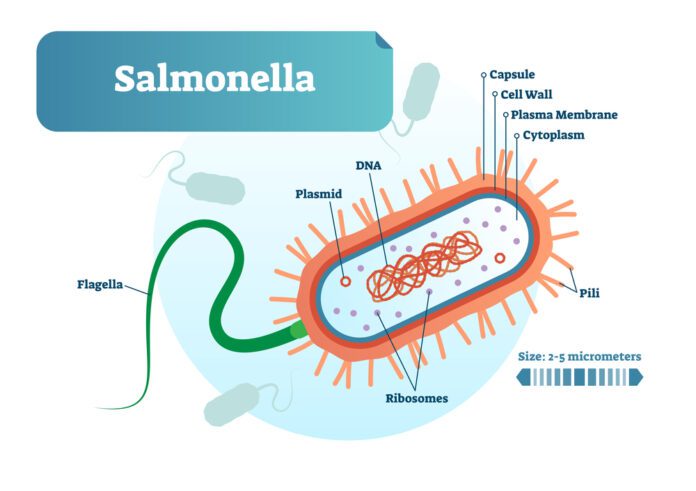Overview Of Salmonella Enterocolitis
Salmonella Enterocolitis is a bacterial infection in the lining of the small intestine that is caused by salmonella bacteria. It is a type of food poisoning.
Commonly Associated With
Salmonellosis; Nontyphoidal salmonella; Food poisoning – salmonella; Gastroenteritis – salmonella
Causes Of Salmonella Enterocolitis
Salmonella infection is one of the most common types of food poisoning. It occurs when you eat food or drink water that contains salmonella bacteria.
The salmonella germs may get into the food you eat in several ways.
You are more likely to get salmonella enterocolitis if you:
- Eat foods such as turkey, turkey dressing, chicken, or eggs that have not been cooked well or stored properly
- Are around family members with a recent salmonella infection
- Have been in or worked in a hospital, nursing home, or other long-term health facility
- Have a pet iguana or other lizards, turtles, or snakes (reptiles and amphibians can be carriers of salmonella)
- Handle live poultry
- Have a weakened immune system
- Regularly used medicines that block acid production in the stomach
- Have Crohn disease or ulcerative colitis
- Used antibiotics in the recent past
Symptoms Of Salmonella Enterocolitis
The time between getting infected and having symptoms is 8 to 72 hours.
Symptoms include:
- Abdominal pain, cramping, or tenderness
- Chills
- Diarrhea
- Fever
- Muscle pain
- Nausea
- Vomiting
Exams & Tests
Your health care provider will perform a physical exam. You may have a tender abdomen and develop tiny pink spots, called rose spots, on your skin.
Tests that may be done for salmonella enterocolitis include:
- Blood culture
- Complete blood count with differential
- Test for specific antibodies called febrile/cold agglutinins
- Stool culture for salmonella
- Examination of stool for white blood cells
Treatment Of Salmonella Enterocolitis
The goal is to make you feel better and avoid dehydration. Dehydration means your body does not have as much water and fluids as it should.
These things may help you feel better if you have diarrhea:
- Drink 8 to 10 glasses of clear fluids every day. Water is best.
- Drink at least 1 cup (240 milliliters) of liquid every time you have a loose bowel movement.
- Eat small meals throughout the day instead of 3 big meals.
- Eat some salty foods, such as pretzels, soup, and sports drinks.
- Eat some high-potassium foods, such as bananas, potatoes without the skin, and watered-down fruit juices.
- If your child has salmonella enterocolitis, it is important to keep them from getting dehydrated. At first, try 1 ounce (2 tablespoons or 30 milliliters) of fluid every 30 to 60 minutes.
- Infants should continue to breastfeed and receive electrolyte replacement solutions as recommended by your child’s provider.
- You can use an over-the-counter drink, such as Pedialyte or Infalyte. Do not water down these drinks.
- You can also try Pedialyte freezer pops.
- Watered-down fruit juice or broth may also help.
- Medicines that slow diarrhea are often not given because they may make the infection last longer.
If you have severe salmonella enterocolitis symptoms, your provider may prescribe antibiotics if you:
- Have diarrhea more than 9 or 10 times per day
- Have a high fever
- Need to be in the hospital
- If you take water pills or diuretics, you may need to stop taking them when you have diarrhea. Ask your provider.



